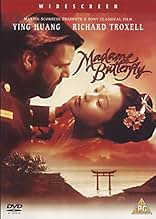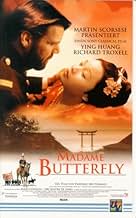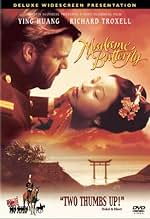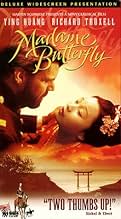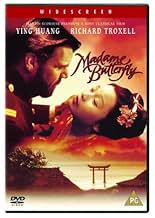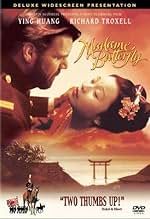Agrega una trama en tu idiomaThe story of a young geisha who falls madly in love with an american captain that travels all around the world collecting hearts.The story of a young geisha who falls madly in love with an american captain that travels all around the world collecting hearts.The story of a young geisha who falls madly in love with an american captain that travels all around the world collecting hearts.
- Dirección
- Guionistas
- Elenco
- Premios
- 1 premio ganado y 1 nominación en total
- Dirección
- Guionistas
- Todo el elenco y el equipo
- Producción, taquilla y más en IMDbPro
Opiniones destacadas
This gorgeously shot and brilliantly directed film version of the opera is the most passionate I've seen. The acting is unusually detailed and truthful for an opera, especially Butterfly's total commitment and Pinkerton's breezy lust.
But why didn't we see his ship sail into the bay? The water and mountains seemed destined for that shot, but didn't deliver. The boy was too old, the voice of the "uncle" in the sky didn't work, but generally it was a deeply moving experience, rising to a terrific climax in her suicide and his remorse. That last closeup of Pinkerton, racked by remorse, lifting the dying Butterfly, was powerful. The film aired in Canada on Aug 8 on the Bravo! TV network. I couldn't tear myself away to get to a party till the final credits were rolling.
But why didn't we see his ship sail into the bay? The water and mountains seemed destined for that shot, but didn't deliver. The boy was too old, the voice of the "uncle" in the sky didn't work, but generally it was a deeply moving experience, rising to a terrific climax in her suicide and his remorse. That last closeup of Pinkerton, racked by remorse, lifting the dying Butterfly, was powerful. The film aired in Canada on Aug 8 on the Bravo! TV network. I couldn't tear myself away to get to a party till the final credits were rolling.
In early August I saw this opera for the first time as a 2017 performance at the Royal Opera House, and I loved the music so much I decided to watch this version as well. What makes this movie stand out is the decision to cast Asian actors and actresses for the Asian roles.
Ying Huang (Cio-cio-san/Butterfly) played the affection-starved yet goodhearted woman beautifully. Richard Troxell (Pinkerton, the American naval officer) played the entitled "playboy" so convincingly I had the urge to slap him through the screen. Jingma Fan (Goro) played the marriage broker; in this version he's not only oppertunistic but also slightly malicious which was surprising but Fan played it well.
The visuals in this movie were unexpectedly beautiful. Instead of depicting the bustling harbour city of Nagasaki they chose a more rural setting with thatched houses; as it was shot "on location" in Tunisia the village is dotted with olive trees rather than pine trees. This was probably done for economic reasons, yet it doesn't feel fake for a moment: the houses look real and lively, the gardens are lined with flowers, people are fishing for mussels in the surf. The costumes and interiors were pretty as well. The cinematography was a bit clunky at times (especially in Act 3) which admittedly bothered me more than it should have.
However, I feel the director took too many artistic liberties. By inserting flashbacks and flash-forwards and making it appear as if days or even months pass between different musical pieces he interrupted the pacing of the music. He also left out a good 10 minutes of music at the beginning of Act 3 ("Oh Eh ! Oh Eh !")
Despite some flaws on the director's part, this still makes for a good movie with good casting, beautiful casting and beautiful visuals. I can recommend this movie to everyone, even the people who don't like opera.
Ying Huang (Cio-cio-san/Butterfly) played the affection-starved yet goodhearted woman beautifully. Richard Troxell (Pinkerton, the American naval officer) played the entitled "playboy" so convincingly I had the urge to slap him through the screen. Jingma Fan (Goro) played the marriage broker; in this version he's not only oppertunistic but also slightly malicious which was surprising but Fan played it well.
The visuals in this movie were unexpectedly beautiful. Instead of depicting the bustling harbour city of Nagasaki they chose a more rural setting with thatched houses; as it was shot "on location" in Tunisia the village is dotted with olive trees rather than pine trees. This was probably done for economic reasons, yet it doesn't feel fake for a moment: the houses look real and lively, the gardens are lined with flowers, people are fishing for mussels in the surf. The costumes and interiors were pretty as well. The cinematography was a bit clunky at times (especially in Act 3) which admittedly bothered me more than it should have.
However, I feel the director took too many artistic liberties. By inserting flashbacks and flash-forwards and making it appear as if days or even months pass between different musical pieces he interrupted the pacing of the music. He also left out a good 10 minutes of music at the beginning of Act 3 ("Oh Eh ! Oh Eh !")
Despite some flaws on the director's part, this still makes for a good movie with good casting, beautiful casting and beautiful visuals. I can recommend this movie to everyone, even the people who don't like opera.
The first time I saw Madama Butterfly was early August 2020, as a 2017 performance at the Royal Opera House. I loved the music so much I decided to watch this version as well. This movie has taken a realist approach to depicting the story by Asian singers for the Asian roles. This choice was slightly at the cost of operatic quality, but if for the sake for top-notch voices the cast had been whitewashed and replaced by singers twice as old, I would have skipped it. This is a movie, not a live performance.
Ying Huang (Cio-cio-san/Butterfly) played the affection-starved yet goodhearted woman beautifully, if not a little stiffly at times. Richard Troxell (Pinkerton, the American naval officer) played the entitled "playboy" so convincingly I had the urge to slap him through the screen. Jingma Fan (Goro) played the marriage broker; in this version he's not only oppertunistic but also slightly malicious which was surprising but Fan played it well.
The visuals in this movie were unexpectedly beautiful. Instead of depicting the bustling harbour city of Nagasaki they chose a more rural setting with thatched houses; as it was shot in Tunisia the village is dotted with olive trees rather than pine trees. This was probably done for economic reasons, yet it never feels fake: the houses look real and lively, the gardens are lined with flowers, people are fishing for mussels in the surf. The costumes and interiors were pretty as well.
However, I think the director took too many artistic liberties. By inserting flashbacks and flash-forwards and making it appear as if days or even weeks pass between different events he interrupted the pacing of the music. He also left out about 10 minutes of music at the beginning of Act 3 ("Oh Eh ! Oh Eh !") The cinematography was pretty during shots of landscapes and outside scenes, but during interior scenes the mostly static shots tended to make the rooms look cramped.
Despite good singers and beautiful set design, its shortcomings on both the cinematic and operatic side make this film fall short of being great. However, it is still good and I can recommend this to everyone.
Ying Huang (Cio-cio-san/Butterfly) played the affection-starved yet goodhearted woman beautifully, if not a little stiffly at times. Richard Troxell (Pinkerton, the American naval officer) played the entitled "playboy" so convincingly I had the urge to slap him through the screen. Jingma Fan (Goro) played the marriage broker; in this version he's not only oppertunistic but also slightly malicious which was surprising but Fan played it well.
The visuals in this movie were unexpectedly beautiful. Instead of depicting the bustling harbour city of Nagasaki they chose a more rural setting with thatched houses; as it was shot in Tunisia the village is dotted with olive trees rather than pine trees. This was probably done for economic reasons, yet it never feels fake: the houses look real and lively, the gardens are lined with flowers, people are fishing for mussels in the surf. The costumes and interiors were pretty as well.
However, I think the director took too many artistic liberties. By inserting flashbacks and flash-forwards and making it appear as if days or even weeks pass between different events he interrupted the pacing of the music. He also left out about 10 minutes of music at the beginning of Act 3 ("Oh Eh ! Oh Eh !") The cinematography was pretty during shots of landscapes and outside scenes, but during interior scenes the mostly static shots tended to make the rooms look cramped.
Despite good singers and beautiful set design, its shortcomings on both the cinematic and operatic side make this film fall short of being great. However, it is still good and I can recommend this to everyone.
Filming an opera, especially one as globally well known as Puccini's, is a daunting challenge because so much of what has been composed and dramatized has been designed specifically for the stage of an opera hall. On one end, there have been superb video recordings of great stage performances, such as the 2005 Salzburg Festival production of Verdi's "La Traviata" with Anna Netrebko and Rolando Villazón. On the other end are adaptations that try to cinematize operas with real locations, though most often with some deficiencies, for example, Barbara Willis Sweete's 2002 production of Gounod's "Roméo et Juliette" with Roberto Alagna and Angela Gheorghiu frankly too old to play the young lovers. In the latter camp, this 1995 French-financed film shows director Frédéric Mitterand making a valid attempt toward authenticity, but he misses a key opportunity to open up the visual and sensory possibilities beyond the obvious. Despite the creative use of Tunisian locations to replicate early 1900's Japan, the result still feels oddly stage-bound and dramatically inert despite some bravura musical moments.
The heavily masochistic story is familiar. In 1904, U.S. naval officer Lieutenant Pinkerton, while stationed in Nagasaki, marries a teenaged girl named Cio-Cio San. Despite their affections for one another, he cavalierly sees the marriage as one of convenience, and when his assignment is done, he goes back to the U.S. with no intention of returning. Cio-Cio San, however, takes the relationship so seriously that she sacrifices her family for the marriage. Three years pass by, but it does not deter Cio-Cio San from hoping for Pinkerton's return since it turns out that she has borne their son in the meantime. Finally, a ship arrives and Cio-Cio San correctly surmises that he is on it. However, tragedy ensues since Pinkerton has remarried in the interim and wants to take his son back to America with him and his new American wife. Taken on the surface, the opera seems defiantly anti-American in showing Pinkerton to be a superficial cad despite how remorseful he may appear at the end, but it also takes a sideswipe at the purportedly subservient nature of Japanese women since her own self-delusions are so intractable. Regardless, the heartstrings are pulled at the right moments when the opera is acted in the manner Puccini intended.
Chinese soprano Ying Huang was chosen over hundreds of young singers for the title role, and while she does not really look Japanese, she displays a sweetly supple voice as she performs the dramatic arc of Cio-Cio San's plight. However, as a screen actress, Huang lacks a certain lightness in the early romantic scenes and seems a bit at sea with the later melodramatic moments. Even though she lacks the plummy depths of a Callas or a Tebaldi, she provides affecting renditions of the two pivotal arias, "Un bel dì vedremo" when Cio-Cio San looks out into the harbor awaiting Pinkerton's return, and her death scene, "Con onor muore". As Pinkerton, admittedly a tough role to play much less sympathize with, American tenor Richard Traxell matches Huang well vocally, but again his acting seems a bit shallow as he only shows unrelenting bravado in the first act and guilt-ridden regret in the third. The others in the cast fare better since there are less dramatic demands on them, in particular, American baritone Richard Cowan as the sympathetic consul Sharpless and acclaimed Chinese mezzo-soprano Liang Ning as the maid Suzuki.
Despite some nice art direction, the visual presentation feels somewhat flat when colors should really pop and the camera be more mobile. There are also some scenes that simply do not work such as having Cio-Cio San's uncles come to banish her from the family in an airborne fashion and the use of anachronistic Japanese newsreel footage as a musical bridge. However, the sound itself is fine with superb orchestral support from the Orchestre de Paris under the baton of James Conlon. There is one extra with the 2002 DVD, a 12-minute making-of featurette which really amounts to following Huang from her initial audition through the actual production.
The heavily masochistic story is familiar. In 1904, U.S. naval officer Lieutenant Pinkerton, while stationed in Nagasaki, marries a teenaged girl named Cio-Cio San. Despite their affections for one another, he cavalierly sees the marriage as one of convenience, and when his assignment is done, he goes back to the U.S. with no intention of returning. Cio-Cio San, however, takes the relationship so seriously that she sacrifices her family for the marriage. Three years pass by, but it does not deter Cio-Cio San from hoping for Pinkerton's return since it turns out that she has borne their son in the meantime. Finally, a ship arrives and Cio-Cio San correctly surmises that he is on it. However, tragedy ensues since Pinkerton has remarried in the interim and wants to take his son back to America with him and his new American wife. Taken on the surface, the opera seems defiantly anti-American in showing Pinkerton to be a superficial cad despite how remorseful he may appear at the end, but it also takes a sideswipe at the purportedly subservient nature of Japanese women since her own self-delusions are so intractable. Regardless, the heartstrings are pulled at the right moments when the opera is acted in the manner Puccini intended.
Chinese soprano Ying Huang was chosen over hundreds of young singers for the title role, and while she does not really look Japanese, she displays a sweetly supple voice as she performs the dramatic arc of Cio-Cio San's plight. However, as a screen actress, Huang lacks a certain lightness in the early romantic scenes and seems a bit at sea with the later melodramatic moments. Even though she lacks the plummy depths of a Callas or a Tebaldi, she provides affecting renditions of the two pivotal arias, "Un bel dì vedremo" when Cio-Cio San looks out into the harbor awaiting Pinkerton's return, and her death scene, "Con onor muore". As Pinkerton, admittedly a tough role to play much less sympathize with, American tenor Richard Traxell matches Huang well vocally, but again his acting seems a bit shallow as he only shows unrelenting bravado in the first act and guilt-ridden regret in the third. The others in the cast fare better since there are less dramatic demands on them, in particular, American baritone Richard Cowan as the sympathetic consul Sharpless and acclaimed Chinese mezzo-soprano Liang Ning as the maid Suzuki.
Despite some nice art direction, the visual presentation feels somewhat flat when colors should really pop and the camera be more mobile. There are also some scenes that simply do not work such as having Cio-Cio San's uncles come to banish her from the family in an airborne fashion and the use of anachronistic Japanese newsreel footage as a musical bridge. However, the sound itself is fine with superb orchestral support from the Orchestre de Paris under the baton of James Conlon. There is one extra with the 2002 DVD, a 12-minute making-of featurette which really amounts to following Huang from her initial audition through the actual production.
Unfortunatly , their lips aren't moving right. So their either lip synching or it's been dubbed. Richard Troxell's the best in this. His emotion drips off the screen. So's his cohort. The actress playing butterfly looks and acts too old for the part. I personally loved this film. But as they are singing in opera terms, many might not appreciate it. It's up to you. (example: I found it to be uplifting and another person found it to be more depressing than The Refelecting Skin.) So what you take from it is entirely up to you. :)
9/10 (can't give it a full 10 because of the dubbing/lip synch problems.
Quality: 9/10 Entertainment: 10/10 (how can you not. with such powerful singing) Replayable: 6/10
9/10 (can't give it a full 10 because of the dubbing/lip synch problems.
Quality: 9/10 Entertainment: 10/10 (how can you not. with such powerful singing) Replayable: 6/10
¿Sabías que…?
- TriviaThe entire Japanese village set and house were built in Tunisia, Northern Africa.
- ErroresDuring Act 2 and Act 3, a blooming wisteria is shown to be growing along the house's roof above the porch. In reality wisteria would not have been grown here as the house's structure would have been unsuitable for it. Wisteria is a plant known to become heavy and massive with age; it would have been grown along a sturdy trellis or stone wall instead as not to cause any damage.
- Citas
Lieutenant Benjamin Franklin Pinkerton: She's like a porcelain doll. She sets me on fire.
Selecciones populares
Inicia sesión para calificar y agrega a la lista de videos para obtener recomendaciones personalizadas
- How long is Madame Butterfly?Con tecnología de Alexa
Detalles
- Fecha de lanzamiento
- Países de origen
- Idioma
- También se conoce como
- Madame Butterfly, de Frederick Mitterand
- Locaciones de filmación
- Productoras
- Ver más créditos de la compañía en IMDbPro
Taquilla
- Total en EE. UU. y Canadá
- USD 65,196
- Fin de semana de estreno en EE. UU. y Canadá
- USD 6,027
- 5 may 1996
- Total a nivel mundial
- USD 65,196
Contribuir a esta página
Sugiere una edición o agrega el contenido que falta

